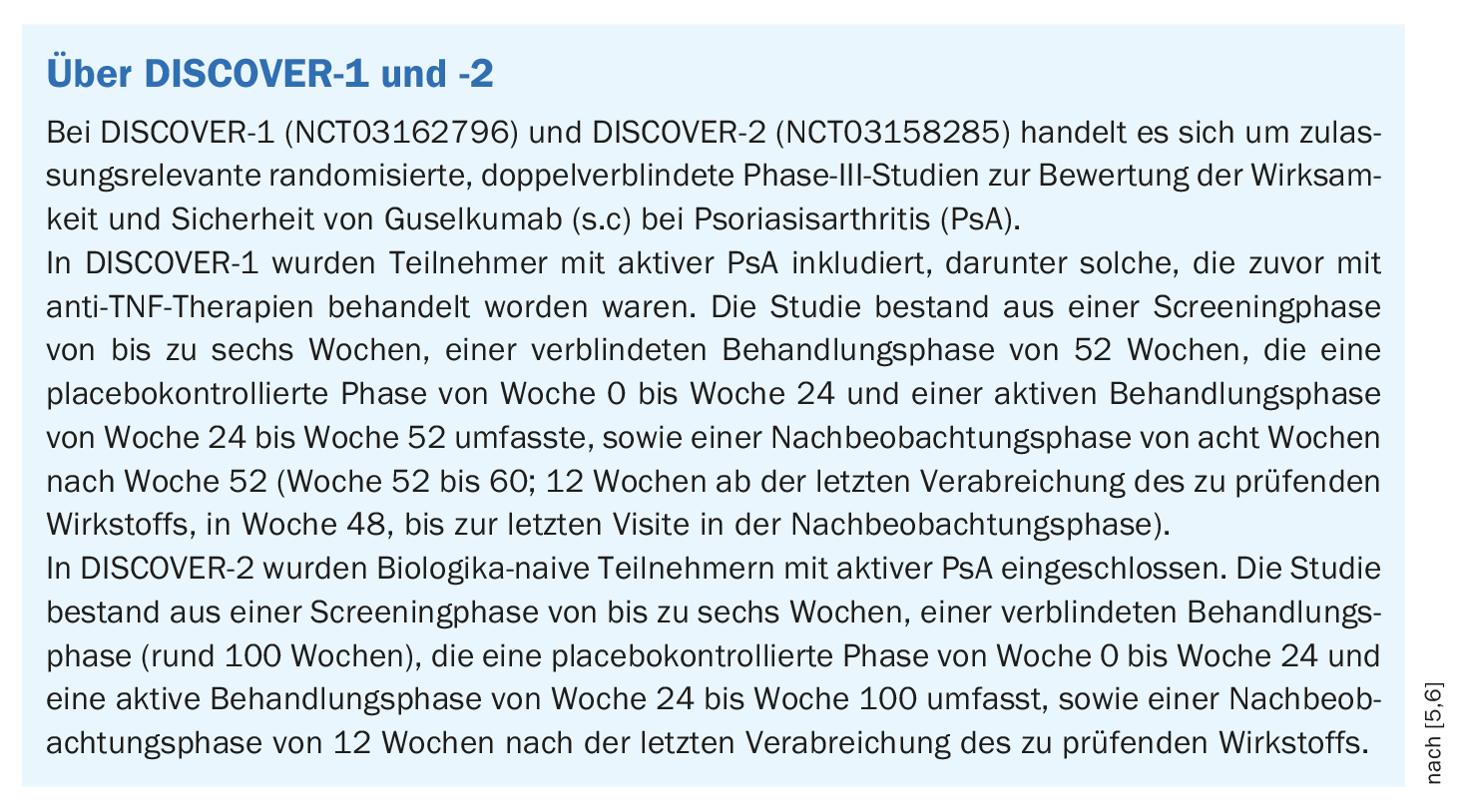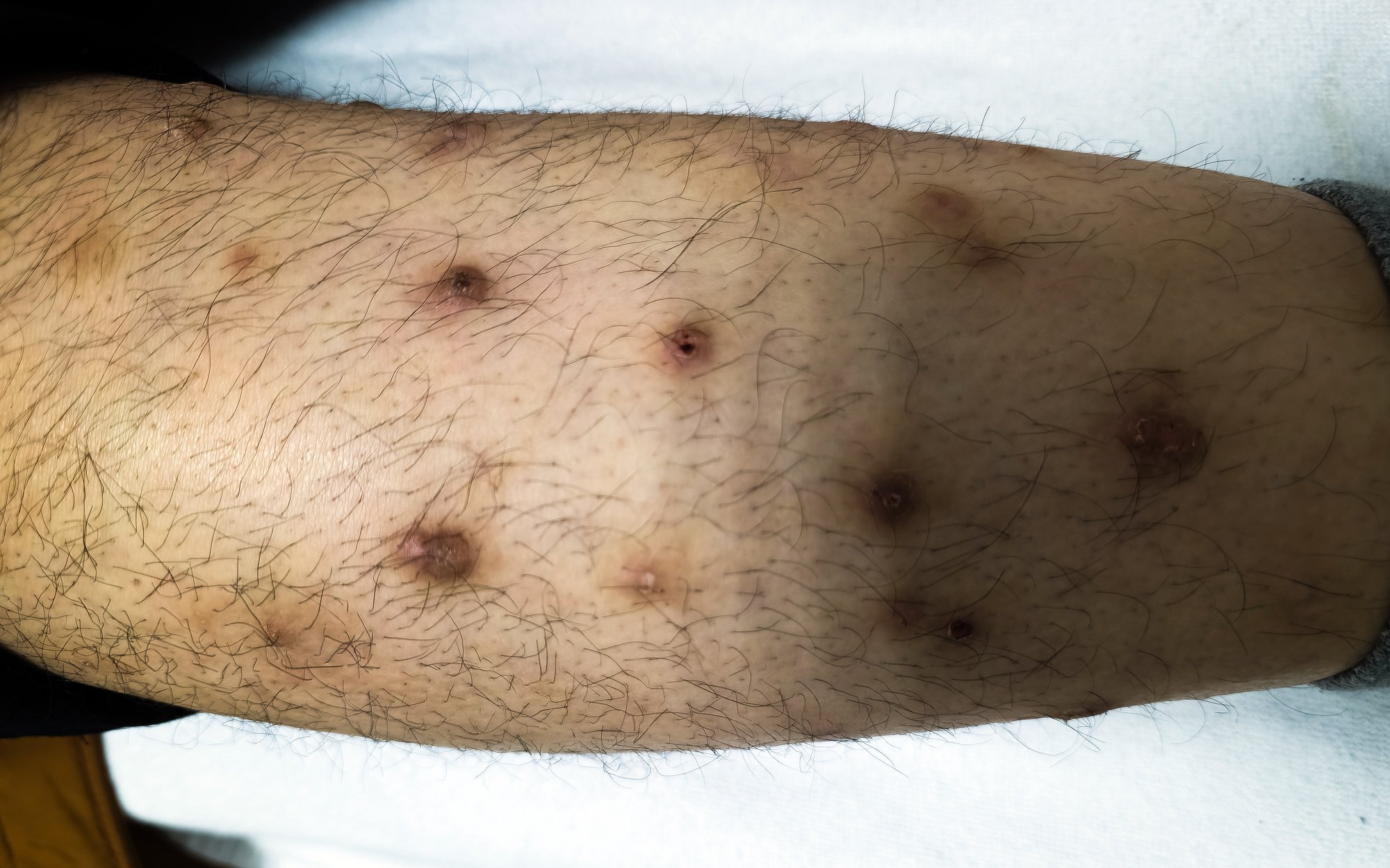Recent analyses of a heterogeneous group of patients with active psoriatic arthritis (PsA) show that early treatment response with respect to skin psoriasis and enthesitis is a predictor of sustained treatment success. The IL-23 inhibitor guselkumab has been approved in Switzerland for the treatment of PsA since 2021.
A recently published post-hoc analysis of the phase III DISCOVER-1 and DISCOVER-2 trials (box) analyzed data from adult patients with active psoriatic arthritis (PsA). This indicates that early treatment response to guselkumab (Tremfya®) predicts longer-term clinical response, including disease remission at week 52 [1–3]. According to another post-hoc analysis of the DISCOVER-2 substudy, in a heterogeneous population of biologics-naïve patients treated with Tremfya®, several PsA-related endpoints were maintained over two years, including minimal disease activity (MDA), appearance-free skin (IGA 0), and disappearance of dactylitis, independent of baseline patient characteristics and dosing regimen [4].

Several relevant endpoints were maintained
The new analyses of the DISCOVER-1 and -2 data show the following [2]:
- At week 24, early skin response was associated with a higher likelihood of achieving MDA (minimal disease activity), DAPSA (low disease activity in PsA), and DAPSA remission.
- Early response of enthesitis was associated with a higher probability of achieving MDA, DAPSA, LDA (low disease activity), and disappearance of enthesitis or dactylitis.
- DAPSA remission was achieved by a greater proportion of patients who had an early response of enthesitis, although this association was significant only at week 52.
- Patients who showed an early response with respect to both psoriasis and enthesitis were more likely to achieve MDA, DAPSA LDA, and DAPSA remission.
In summary, these results underline the relevance of an early treatment response for the further course.
Long-term response across different PsA patient populations.
In another post-hoc analysis of the DISCOVER-2 trial data, the following results were obtained with treatment with Tremfya® in a heterogeneous population of adults with active PsA over two years [4]:
- Several endpoints recommended by GRAPPA for PsA disease control were maintained, including ACR50 and ACR70, IGA 0, resolution of dactylitis and enthesitis, and MDA response. This proved to be independent of the following patient characteristics at baseline: Gender, body mass index (BMI), number of swollen joints (SJC), number of painful joints (TJC), duration of PsA, C-reactive protein (CRP), affected body surface area (BSA), and Psoriasis Area and Severity Index (PASI).
- At week 100, the stringent endpoints were sustained in multiple domains (MDA response, IGA 0, and resolution of dactylitis), regardless of the use of concomitant therapies (nbDMARD and methotrexate).
- No consistent differences in the proportion of responders were observed between patient subgroups with sufficient sample size or between Tremfya® dosing regimens.
- The results of this post-hoc analysis support the long-term efficacy (Week 100) of Tremfya® across the spectrum of active PsA disease domains and diverse PsA patient populations.
Source: Janssen-Cilag
Literature:
- ” New TREMFYA® (guselkumab) Post-Hoc Analysis Reveals Early Efficacy Predicted Longer-Term Efficacy And Sustained Achievement Among A Diverse Active Psoriatic Arthritis Patient Population,” Janssen, Nov. 11, 2022.
- Coates L, et al: Early Skin and Early Enthesitis Responses in Psoriatic Arthritis Patients Treated with Guselkumab Associate with Long-term Response: Post Hoc Analysis Through 2 Years of a Phase 3 Study. (ABSTRACT #2115). Presented at ACR Convergence 2022, November 10-14.
- Drug Information, www.swissmedicinfo.ch, (last accessed Dec. 07, 2022).
- Ritchlin C, et al: Stringent Disease Activity Control at 2 Years Across Psoriatic Arthritis Domains Irrespective of Baseline Characteristics in Patients Treated with Guselkumab: Post Hoc Analysis of a Phase 3, Randomized, Double-blind, Placebo-controlled Study. (ABSTRACT #2112). Presented at ACR Convergence 2022, November 10-14.
- Clinicaltrials.gov: A Study Evaluating the Efficacy and Safety of Guselkumab Administered Subcutaneously in Participants With Active Psoriatic Arthritis Including Those Previously Treated With Biologic Anti-Tumor Necrosis Factor (TNF) Alpha Agent(s) (DISCOVER-1). https://clinicaltrials.gov/ct2/show/NCT03162796, (last accessed 07.12.2022)
- Clinicaltrials.gov: A Study Evaluating the Efficacy and Safety of Guselkumab Administered Subcutaneously in Participants With Active Psoriatic Arthritis (DISCOVER-2). https://clinicaltrials.gov/ct2/show/NCT03158285, (last accessed 07.12.2022)
DERMATOLOGY PRACTICE 2022; 32(6): 29











